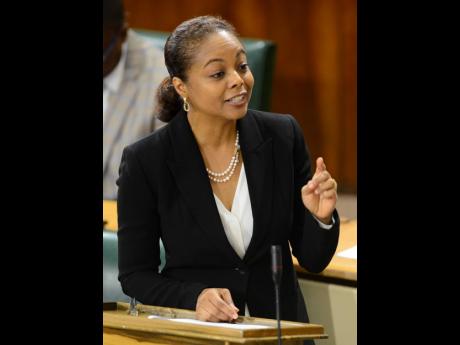AG: People should know who sex offenders are
Attorney General Marlene Malahoo-Forte has supported a call by the head of the country’s chief child-protection and welfare organisation for a more transparent sex offenders’ registry. She argues that the restriction on who can access the registry may defeat its purpose.
Rosalee Gage-Gray, chief executive officer of the Child Protection and Family Services Agency (CPFSA), in a Gleaner report published on Thursday, said that she would not be averse to having the registry, managed by the Department of Correctional Services, open to public scrutiny.
According to the DCS’s website, “all information in the register and the registry shall be secret and confidential”, and “access to information in the register or registry can only be given to persons or organisations who are deemed to have legitimate interest, such as members of the Jamaica Constabulary Force...”.
In an interview with The Gleaner, Malahoo-Forte said that while there were issues with having the sex offenders’ registry accessible to the public, people should know who pose a threat to them.
PROTECT VICTIMS
“The whole purpose of registering people is to ensure that the others know. So if access is not readily available in order to inform persons, it may defeat the goals of keeping the register in the first place,” the attorney general said late last week, following the launch of the National Conference on Technology in the Justice Sector at the AC Marriot Hotel in St Andrew.
“There are other issues that you have to think through, but at the end of the day, it’s to ensure that those who are likely to harm others by past behaviour, that they are known. The keeping of a sex offenders’ register is not unique to Jamaica … . People have to know who they are in order to protect likely victims. Doesn’t it stand to reason?” she added.
Malahoo-Forte also pointed out that someone who had been convicted of a sexual offence could not retreat to the right of privacy while there was a sex offenders’ registry.
However, her colleague Justice Minister Delroy Chuck, who also spoke to The Gleaner after the launch, was more ambivalent on the issue.
“It’s a matter than can be considered, but you have to be very careful [with] persons who have served their time and are no longer offending… . To open them up to further abuse or exposure might indeed be a breach of their fundamental rights.
“What I mean is that if they are not engaged in any sort of wrongdoing, I think that they should be protected. But if persons constitute a danger on the sex registry, then people should know that these are persons who constitute a danger to the public, and, therefore, people should be warned, at least, not necessarily broadcasting it, but the registry should be there for such persons that persons can examine and see who pose a danger,” Chuck said.
In 2019, the CPFSA reported that there were 2,623 cases of sexual abuse against children, representing an increase of 276, or 12 per cent, over the previous year, when 2,347 cases were reported.

